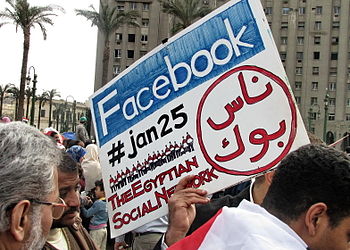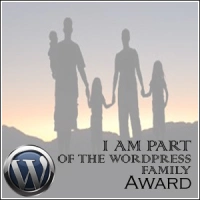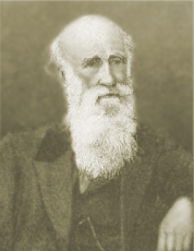Over the past few years you may have noticed a change in the way you are consuming content. With more and more large companies looking to find ways to connect to their ideal consumer there has been a shift in the way content is being developed and shared.

A protester holding a placard in Tahrir Square referring to Facebook and Twitter, acknowledging the role played by social media during the 2011 Egyptian Revolution. (Photo credit: Wikipedia)
We may consider “Social media” to be still in their infancy, but the baby is growing much faster than many would have thought. It’s already possible to identify two things at which they are extremely good : information sharing and co-ordination. However, neither of these advances provides a substitute for face-to-face interaction in confronting – and ultimately transforming – the structures of social, political and economic power.
Information sharing has been the primary achievement of social media to date. In the past lots of things could stay hidden for the public and often politicians or CEO’s took care that certain matters never came public. Nothing stays hidden for long. Uploading self-authored content, whether instant news footage or opinion or competing data, has fundamentally changed the way politics works. Governments can no longer hope to hide inconvenient facts or control their own narrative when there are so many sources of alternative information and analysis available.
Media hubs were greatly used to have various types of content – articles, videos, images, etc – exist for the purpose of engaging audiences and spreading knowledge and information to current and future customers. Many more companies found their way to social media and used Facebook and Twitter to get their products information shared at no cost by having Facebook and Twitter people sharing the information and licking it.

Infographic on how Social Media are being used, and how everything is changed by them. (Photo credit: Wikipedia)
The naive public got bombarded by advertisements and commercials and coming closer to the year many started feeling the social media were consuming lots of time but not making them really more happy. Already at the end of 2013 many had made the promise not to spend so much time on the social media, but had not managed to keep to their promises. Though, according to the internet and mobile telephone providers a trend of putting Facebook more at the side is showing the last few months, where less data traffic occurred than last year for the same period.
At the moment having an organized content-filled page for each of the areas of expertise of a company, the writers on the net are still able to engage different audiences in different ways while still maintaining the overall media hub feel.
Whereas text can be misinterpreted, images and videos provide more concise delivery of information. 2014 saw many more info-graphics coming onto the market. Businesses tried offering more videos, better images, and cooler media in accordance with their online presence in the hope to reap significant benefits. They became aware that media can be keyword-tagged for better optimization for the searches that possible customers will most likely make. More customers that way also got more lured in looking further and could find certain companies much easier in the crowd of their competitors, because of image and video searches.
Still too many companies are not taking the customers serious. When consumers are asked about issues they’re facing they want two things in return: a response and/or a conversation, and an action to fix it. Addressing the responses that companies receive when asking about pain points is great, but it could very easily end up feeling like an empty gesture if months have passed and nothing has been done about it. At the moment we still can see that lots of reactions of customers are put aside and not taken serious. This makes that more people have no feeling of strings any more with a certain brand or company or provider of goods. This made the search on the internet for the cheapest greater, but also gave way to a lot of false or copy-goods and dubious plus even very dangerous products finding their way on the market.
On the other hand internet is also been used to activate lots of people to react to wrong situations. Though the governments and corporations who find themselves the object of unwanted critical attention started to work out that the tigers that roam the activist jungle lack teeth. The more social media-based organizations make demands that remain unmet, the less power they have to wield, and the less attractive they are to joiners who hope to make a difference. There have been companies like Avaaz.org, for example, which makes a great deal of its headline membership figure of 38 million people – rising every second – and its victories. It wants to convince us that time and money has made an impact. But would an audit of all the campaigns undertaken reveal more wins than losses? And in any case, isn’t it impossible to know what precise difference an Avaaz petition has made, especially in the hard cases, the great powers, or Israel, Sri Lanka, Iran or Syria? Don’t governments just need to wait for the fuss to die down? Does this sort of activism only work against weak governments?
In 2014 we could see that sporadic, disconnected campaigns, crowd-funded protest and flash mob-style priority setting, social media have clearly made a difference to the profile of issues and the scale of activism. Lots of people have come to see how they may be a powerful tool and have greatly increased the number of people who say they are activists. Though when I wanted to see some more literal action, are invited more people to write more deep going essays, I encountered silence. This also made me wonder how committed these new activists are and how much they are prepared to come personally in the open. With the social media it seems a lot of persons are hiding behind their profile. We should question how effective they can be if all they do is sign an online petition while sitting at their desks? Don’t social media exacerbate the fundamental problem of mobilization, which is free-riding, thereby undermining the long-term impact of social activism on the deep structures of power, inequality and violence?
I am pleased that traditional social movement organisations or even NGOs may survive, by and large, on the efforts of highly motivated individuals, but the key element of social movements – the glue which binds them together – is diluted: personal, direct engagement in collective action. Today many people have come afraid to show their true face and social media as Facebook have become an ideal tool to put on a different or ‘would-like to be’ face.
writes:
Solidarity flourishes when people work together face-to-face in the same endeavour. This creates ‘effervescence’ as French sociologist Emile Durkheim once put it. But effervescence declines as scale grows, its antithesis being the power of social media to generate large numbers and worldwide visibility at low cost to contributors.. {Why social media won’t transform our politics}
As Martin Luther King said
“But it is not enough for us to talk about love,”
I also do believe the talking has to be accompanied by doing. With my two Lifestyle magazines I also tried to get more people involved in showing others different ways of living than the way the general world is developing to. I also wanted to show the balance we should go for he and the justice we should work for.
“And justice is love in calculation. Justice is love working against anything that stands against love. Standing beside love is always justice.”
said King and continued;
“There lived a people, a black people, “a people who had the moral courage to stand up for their rights, and thereby infused new meaning into the veins of history.”
Today it seems not many are interested any more to stand up for their and even less for others their rights. Doing “as if” is very easy from the comfort of a chair, but as soon as there is demanded much more, many people draw back in their little cocoon and stay safe at their luxury home. Not many writers, photographers, or illustrators presented themselves to co-operate.
Michael Edwards, a writer and activist based in upstate New York, and the editor of Transformation, his website is www.futurepositive.org, writes:
Today there is a resurgence of interest in the possibilities of transformation and an upsurge in attempts to put them into practice, spurred on by the failure of conventional approaches to make much headway against inequality and the urgency of problems like climate change which demand boundary-breaking solutions. That’s why we launched Transformation as a new section of open Democracy on July 1, 2013. The section is designed to celebrate and debate the practice of radical change in our societies, examined through the interaction between love and social justice.
King, of course, was drawing from much older sources when he made his remarks that night, including philosophers like Royce and later on Paul Tillich (the subject of his doctoral dissertation), the legacy of Mahatma Gandhi and his Satyagraha movement, and the traditions of the social gospel. It’s also fair to say that there were others in the civil rights movement like Fannie Lou Hamer and Ella Baker who translated King’s words into on-the-ground realities with much more consistency, through their commitment to grassroots democracy and the struggle against sexism among their colleagues. {Welcome to Transformation}
Nothing much is really changed.
Then as now, there will be no end to patriarchy without deep-rooted changes in men’s behavior; no solution to climate change unless all of us reduce our consumption and carbon footprint; no decline in inequality unless we learn to share resources with each-other; no meaningful democracy until we work through our differences in a spirit of common purpose; no lasting peace if we continue to project our fears and insecurities onto other people. {Welcome to Transformation}
Many ore people should come out into the open air, should give their voice to platforms where more people can be reached, because more voices can be found together. Co-operating, joining hands can create a chain which is much stronger than individual buds.
But 2014 showed also how easy it is to silence somebody, when some of my websites got censured. (Delay in publications because attack from outside, Certain people trying to stem freedom of speech)
A campaign can be waged in the street, by mail, on the phone and online. Through direct action and it can represent a form of justice in the public sphere, the utilisation of public shame as a means to circumvent judicial failings through the praxis of performance. In the previous years we could see that certain people took advantage of the protesters to take revenge on society, but in 2014 it looked like more people had come to the senses that they should not as such let others feel to be pressed against a wall or to be the victims of revenge.
Elliott Goat, a freelance UK based journalist who has written for multiple publications including The Independent, Chicago Sun Times and El Pais recognised also this phenomenon and refereed to Benegas, , Diego, ‘If There’s Justice…’ Trauma and Identity in Post-Dictatorship Argentina. Performance Research: a Journal of Performing Art, Vol. 16, issue 1, 2011 p.24:
Crucial to this question is the concept of containment. Central to the success (and effectiveness) of the escrache is the establishment of a clear boundary – which the performance serves to highlight but which the action refuses to cross. ‘The performance makes the case for revenge and concretizes the struggle in a localised place but the escrache does not cross the boundary to inflict physical harm – it stops literally at the doorstep.’
and to Benegas, 2011 p.24:
By showing that they could but will not take revenge, the action becomes a statement about the identity of its agents.
As individuals we do not seem to have much power, but we may not forget that when we should let others feel our connection worldwide, we shall be able to convince others and get the ball rolling. And yes, we shall be able to
convoke a festival whose duration is not marked by the logic of ‘harassment’ nor by that of the TV newscast. {Colectivo Situaciones. Situational Knowledges (the Escrache), 19th & 20th: Notes for a New Social Protagonism, Common Notions, New York, 2003 p.204}
As you can find in my other chapter on the evolution in 2014 (2014 Politics) from what is happening in the United states of America, how politicians try to confirm their power, we can see that more and more the amount of money a person or group has how stronger he or the organisation can come in the forefront and lure the public in its basket. The rich and the powerful have lobbyists and lawyers and plenty of friends in the governing bodies and demand from them a return of favour.
We, as general public should be alert and be prepared to take up the causes that others neglect and waging the fights that others fear. Many more people should be conscious that the most important campaigns are those that fall short in the battle for votes but win the battle of ideas.
The great media struggle of 2014 was to protect net neutrality and, with it, a free and open Internet. But beating back cable-industry schemes to create Internet fast lanes for those who can pay is just step one. High-speed broadband Internet service is too costly and too unreliable in much of America. Access to the web is too important to be left to chance and profiteering; it should be provided as a municipal utility. Impossible? Hardly. The Institute for Local Self-Reliance (ILSR) identifies more than 130 cities that operate publicly owned broadband networks. These networks are so good that—you guessed it—telecom corporations are pressuring state legislatures to prevent their expansion. The FCC should intervene on behalf of communities and consumers. In the meantime, this idea needs to go big. It’s exciting that ILSR’s Community Broadband Networks Initiative is spreading the word, and that local officials like Seattle City Council member Kshama Sawant are taking up the cause. “In today’s world, Internet access should be viewed as a human right,” Sawant states. “Job searches and social services often require regular, at-home access to the Internet. And major cities like Seattle have the ability to lead the way with low-cost, publicly owned municipal broadband.” {John Nichols, Zephyr Teachout, Hands Up United and John Oliver Made Our 2014 Progressive Honor Roll. Who Else Made the List?}
Pope Francis I warned that the speed with which information is communicated exceeds our capacity for reflection and judgement, and this does not make for more balanced and proper forms of self-expression.
The variety of opinions being aired can be seen as helpful, but it also enables people to barricade themselves behind sources of information which only confirm their own wishes and ideas, or political and economic interests. The world of communications can help us either to expand our knowledge or to lose our bearings. The desire for digital connectivity can have the effect of isolating us from our neighbours, from those closest to us. We should not overlook the fact that those who for whatever reason lack access to social media run the risk of being left behind.
2014 saw on WordPress a total of 18,300,771 New Blogs, that’s 49,997 new blogs per day! With a total Posts 555,782,547 or more than 1.5 million per day — not too shabby. 47 million were published from mobile devices, because lots of people are on the go and seem to be very busy transferring 24.5 Trillion Bytes of Data per Hour.
The top five most popular posts from WordPress.com bloggers racked up 15,849,804 views without a hitch — and our VIP services handled over 28 billion views. When millions clicked on posts from bloggers on the ground in crisis situations in West Africa, Venezuela, or Egypt, our systems helped their voices be heard around the world. {Im(Press)ive! Your Year in Review}
I am very grateful to the many WordPress.com engineers who deployed 64,056 improvements and fixes to make sure WordPress.com websites can handle whatever traffic spikes the internet throws at them, but I do hope they shall not renew things just to renew, like I do find the recently presented new ways of publishing (the improved posting experience) not as good as the classic publication manner I am still using.
New social contacts can be made by going further than the own region. What way can be better to broaden the mind than going abroad once in a while. Though lots of people going to some far away place just take a plane or boat to go and sit around a swimming pool all day long. Tourism numbers have shown almost continued growth over the past six decades – from 25 million in 1950 to 278 million in 1980, 528 million in 1995 and 1.87 billion in 2013. The strongest growth in 214 has been in the Americas including the Caribbean, with tourist numbers in the region up eight percent.
An exhibition celebrating the history of communications technology got a very modern royal seal of approval from Her Majesty Queen Elizabeth II, who opened the gallery October 24 by sending her very first Tweet.
 The Queen sent the Tweet from the @BritishMonarchy Twitter account in front of 600 guests from the world of science and technology. They were gathered to celebrate the new Information Age gallery at London’s @ScienceMuseum, an exhibition that explores the technological breakthroughs that have transformed how we communicate. (The account had previously been managed by palace officials.)
The Queen sent the Tweet from the @BritishMonarchy Twitter account in front of 600 guests from the world of science and technology. They were gathered to celebrate the new Information Age gallery at London’s @ScienceMuseum, an exhibition that explores the technological breakthroughs that have transformed how we communicate. (The account had previously been managed by palace officials.)
The Queen’s Twitter debut comes a few months after that of her grandson, Prince Harry, who sent a message on the social network in May to celebrate the forthcoming Invictus Games.
Earlier in the day, the @BritishMonarchy account released a series of tweets about the Queen’s use of novel communications technology during her reign. She made her first televised Christmas broadcast in 1957 in which she spoke about
“the speed at which things are changing all around us” .
Social media was also used to bring people together to have their voice heard in contestations or to let the world hear their sentiments for a certain case.
Once more it proved in 2014 that Social Media very fast could get lots of people reacting strongly or coming together at certain places. Facebook, Twitter, YouTube, Causes a.o. managed giving people of every age, sex and accomplishment a vehicle to spread support for causes. Through a simple YouTube video or message on a Facebook wall, activism can happen from any individual his or her computer chair. We can not deny that social media is paving the way for many causes and all sots of voices.

Bor Verkroost 35-year-old Dutchman wanting in 2014 it to be the last year of his life, full of pain from his epidermolysis bullosa (EB),
The 35-year-old Dutchman Bor Verkroost, director by 1-UP Consultancy, suffers from a debilitating skin disease bringing him to endure constant pain. In 2014 his doctor received Bor’s request for an irrevocable step, but he did not fight Verkroost on the idea. Rather, he was ready to help his patient step out of this life at Verkroost’s signal.
Born with epidermolysis bullosa (EB), an incurable condition that causes external and internal skin blisters he has undergone 61 surgeries, including one in 2009 to amputate three fingers. He has skin cancer that can only be cut away, and it’s spreading. One of his hands has scarred into what he calls a “permanent fist.” The other cancerous hand lives in a bandage.
Though looking at his Facebook page he seemed to have won courage in looking a wife and being part of the Facebook page and program Bor Zoekt Vrouw plus the EBor Foundation that centers around his personality. With the foundation he seemed to have found new hopes and dreams, and found a way to coop with his very rare genetical disorder: Epidermolysis Bullosa.
Despite all the setbacks he encounters because of his failing body, he is someone who relentlessly pursues his dreams and ambitions! He found a group of friends very close to him who have dedicated themselves to helping him achieve this.The fact that EB is so rare and unknown often leads to bias and misunderstandings. The EBor Foundation, starring Bor on our main stage, was brought to life to create a broader awareness on EB.
Social Media can bring people in trouble. Not only may people use false names which could be the real name of somebody else, and as such may bring those in problems not to say even in danger.
Amidst Tunisia’s competitive presidential race, Facebook has been accused of launching a crackdown on pseudonyms. As Raed Chammam explains in a blog post, more than one hundred Tunisian users of the site were reported for using a “fake name,” resulting in some switching to use of their real names, while others were banned from the site. Chammam writes that the accounts were reported as part of a targeted campaign against supporters of the political opposition. {Digital Citizen 2.2}
Prominent human rights activist Nabeel Rajab was charged with insulting the Ministries of Defence and Interior on Twitter and therefore could face up to six years in prison.
Sayed Jameel Kadhim, a member of the now-banned opposition group Al Wefaq Society, is facing investigation over a tweet referencing the role of “political money” in Bahrain’s legislative elections on Nov 22.
Women’s rights activist Ghada Jamsheer spend two and a half months in jail on charges of defamation via twitter.
In Kuwait activist Hamed Buyabes has been charged of insulting Saudi Arabia on twitter.
In Lebanon Karim Hawa was detained in mid-November by the Lebanese Cybercrime Unit for sharing a Facebook a post alleging that the company contracted by the Lebanese interior ministry for the production of biometric passports has “links with Israel”. After spending few days in detention, a judge ordered the release of the 21-year-old on Nov. 17. A few weeks after, Karim got his computer and his phone back. {Digital Citizen 2.2}
In Iraq and Syria nobody is safe for what they write on social media and Reporters Without Borders published a timeline of violations against freedom of information committed in Iraq and Syria.
Palestinians living in Israel have started placing “Second Class Citizen” stamps on their Facebook profile pictures to protest a new Israeli government anti-terror plan that would give the government cause to revoke Israeli citizenship from Palestinian nationals living in their country. The plan also includes a ban on the use of the Palestinian flag and on the use of social media to express support for terror attacks. {Digital Citizen 2.2}
+
Preceding reviews of 2014:
Politics in the United States of America
2014 Politics all over the world
Next:
2014 To remember our Earth
+
Find additional reading:
- The Importance of Creating a Media Hub for Your Small Business (and how to do it)
- 6 Ways to Enrich Content and Media Online
- Why social media won’t transform our politics
- Performing popular justice: from the disappeared to the outraged
- Changing attitude & Subcutaneous power for humanity 3 Facing changing attitudes
- Vital (Travel) Statistics – 2014, Brighter 2015
- Putting your feelings into words and sharing them
- The royal tweet: Queen sends first Twitter message (video)
- Message of Pope Francis I for the 48th World Communications Day
- EBor foundation
- People Seeking for God 4 Biblical terms
- Commemorating the escape from slavery
- Changing screens
- This Week Twenty-Five Years Ago: The Velvet Revolution Succeeds, December 1989
- Consider your own journey in life
- Wisdom not hard to find nor hiding in remote places
- Discussion about Democracy
- Freely & fairly
- Delay in publications because attack from outside
- Certain people trying to stem freedom of speech
- Let’s Talk HappinessHelp us to get better known
+++
Related articles
- Data sharing could make international travel difficult (mysecuritysign.com)
What you say online can hurt your chances of entering a country you plan to visit. Many countries are making it tougher for people to cross their borders, and thanks to personal databases flowing freely between countries, they are having an easier time doing so.“As more data is being amassed, it is being moved more quickly and easily between government agencies and immigration authorities,” says Suzanne Nossel, executive director of the PEN American Center, “so there can be more of a chance of something popping up.” - Keeping your children safe during Christmas (dominicanewsonline.com)
The NGO Coalition for the protection of children draws your attention to the fact that holiday times are often anything but happy for some of our children. - Social Media: A Floor for Activism (digitalsurgeons.com)
Even though the days of picket signs and marching for rights haven’t ceased to exist, activism is finding a new home with social media. More causes are popping up on Twitter, Facebook and YouTube, more so than on your local news. Several campaigns are spreading fast and receiving more and more coverage due to social media. Here are three campaigns that have found a voice through social media, giving hope to causes big and small. - Manshiyet Nasser NGO facing eviction (madamasr.com)
The Nebny Foundation is a charitable and developmental organization, originally established in 2012 by a group of youth working on development in the local area, close to the Moqattam Hills. Three years ago, the foundation’s founders spotted a unique area in the middle of the Manshiyet Nasser, where they could establish a headquarters for the NGO. The old one-floor building was originally owned by Cairo Governorate, until then-governor Abdel Kawy Khalifa issued a hospitality decree to hand over the building to the NGO without official permits. - NGO seeks celebrity’s assistance (fijitimes.com)
“We recently lost our home and we are now operating on a temporary basis,” the Animals Fiji founder saidAnimals Fiji started off with 20 animals and now looks after 85 animals.Ms Quimby said throughout the years, they had de-sexed about 1300 animals and found homes for 2600 cats and dogs.She said they hoped to get some much-needed assistance through DeGeneres’ network of celebrities and organisations.
After relocating last year, Animals Fiji is looking for ways to raise funds to purchase a permanent home for its office in Nadi.
- 5) Recently the government stopped foreign funding of few NGOs working in India accusing them of affecting development processes in India. Critically discuss the role of NGOs in development processes. Also comment if the government’s decision is correct. (insightsonindia.com)
- Digital Citizen 2.2 (advocacy.globalvoicesonline.org)
Prominent human rights activist Nabeel Rajab wrote about his recent arrest for the Huffington Post. Charged with insulting the Ministries of Defence and Interior on Twitter, Rajab could face up to six years in prison. Rajab believes that the tweet in question was merely a technicality — he suspects the real reason for his arrest was a European tour he conducted last summer to talk about human rights violations in Bahrain.Sayed Jameel Kadhim, a member of the now-banned opposition group Al Wefaq Society, is facing investigation over a tweet referencing the role of “political money” in Bahrain’s legislative elections on Nov 22. In the tweet posted on Oct. 9, Kadhimalleged that those who run for the legislative elections are paid as much as 100k Bahraini dinars (roughly USD $265,000).






























 Biblestudents – Bijbelstudenten
Biblestudents – Bijbelstudenten 0 + Bloggers for Peace
0 + Bloggers for Peace Free Christadelphian Ecclesia
Free Christadelphian Ecclesia Hoop tot Leven – Redding in Christus
Hoop tot Leven – Redding in Christus Vrije Broeders in Christus (Free Flemish Christadelphians on Wordpress)
Vrije Broeders in Christus (Free Flemish Christadelphians on Wordpress)















Pingback: 2014 Personalities and Obituary | Marcus Ampe's Space
Pingback: 2014 Religion | Marcus Ampe's Space
Pingback: Illusion of Separateness | From guestwriters
Pingback: Wrong choices made to get rid of Assad | Marcus Ampe's Space
Pingback: Summermonths and consumerism | From guestwriters
Pingback: Social media and asylum seekers | From guestwriters
Pingback: Israeli leaders delight in Europe’s cruelty toward refugees | From guestwriters
Pingback: My two cents on the refugee crisis | From guestwriters
Pingback: Manipulated content on social media | Marcus Ampe's Space
Pingback: Here is the truth or the lie | Marcus Ampe's Space
Pingback: 31 years ago also facing a world threat – Some View on the World
Pingback: Eyes on pages and messages on social media | Marcus Ampe's Space
Pingback: Climate Warrior: Dismantling perfectionism and activism – Some View on the World
Pingback: The longest-lived and longest-reigning British monarch is not any-more – Some View on the World
Pingback: Elizabeths and Charles I-III | From guestwriters
Pingback: A culture of “democratic cleansing” – Elders and youngsters versus respect | From guestwriters
Pingback: For those who want to look at the world from another point of view – Some View on the World
Pingback: To maintain a healthy relationship with technology | From guestwriters